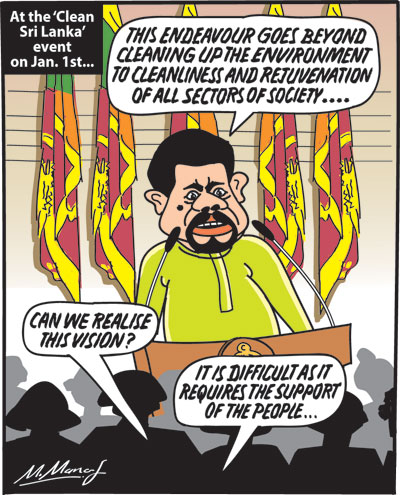Columns
The realisation of the ‘Clean Sri Lanka’ socio-economic transformation
View(s):Never before in the nation’s post-independence history has a Sri Lankan leader, a president or prime minister, unveiled a visionary programme for the nation’s holistic transformation as President Anura Kumara Dissanayake has done with the launch of the “Clean Sri Lanka” campaign on January 1. However, the realisation of the government’s visionary socio-economic transformation is a Herculean challenge.
Concept
The government’s revolutionary programme is in conformity with the views of many sociologists, who have pointed out that economic development is dependent on the transformation of the people’s social values and beliefs. Among these social scientists are Gunnar Myrdal, Everet Hagen, and Lawrence Harrison, who have argued that economic development cannot be achieved without a transformation of the beliefs, attitudes, and values of a people.
History
The truth of this is in fact borne out by the history of Japan, European countries, and Singapore, among others. Several eminent economic historians have shown that a country’s economic take-off and self-sustaining growth is a mammoth social engineering feat.
Consequently, implementing the clean Sri Lanka socio-economic transformation is an enormous endeavour.
Implementation
Implementing the programme—a “vision of a political, social, and economic transformation”—is an enormous challenge.
Popular support
The expectation of popular support is unrealistic in our political culture and social milieu. In fact, the transformation of these values is itself a huge component of the programme. The first week’s public and political attitudes and behaviour demonstrate this.
Opposition
In the week after the Clean Sri Lanka initiative was inaugurated, there has been a plethora of criticisms within and outside parliament. These have followed a pattern of commending the objectives and criticising its operations.
It is important that the programme’s importance is not distracted by trivialities, as happened last week in respect of ‘cleaning’ buses and three-wheelers. The government must focus on the implementation of reforms that have a pervasive impact on the country’s development.
Vision
President Dissanayake’s ‘Clean Sri Lanka’ programme is a holistic one. In his words, “This endeavour goes beyond merely cleaning up the environment. It aspires to restore the deeply eroded and deteriorated social and environmental fabric of our motherland. We aim to create cleanliness and rejuvenation across all sectors of society.”
People’s participation
Popular support and active people’s participation are vital for the successful implementation of the programme. As the president pointed out, “The success of the ‘Clean Sri Lanka’ programme will depend solely on the active participation of the people. Without that, this cannot be achieved merely by laws imposed by the government or by officials appointed by the government. It is only through the collective effort of the public that we can make this a success.”
This is the Achilles heel of the endeavour.
Criticism
As to be expected in our political culture and behaviour, there was a spate of criticism from politicians and others opposed to the government. Such criticisms are prefaced by admitting that the envisaged cleaning of Sri Lanka is needed, but that the government has no capacity to implement it or even that there is no mention of the clean Sri Lanka programme in the JVP/NPP manifesto.
The implementation of cleaning Sri Lanka will face continuous criticisms that should not vitiate the efforts of the government and people. On the other hand, the government must heed the critics who point out weaknesses in implementation and make useful suggestions.
Summing up
The country has arrived at a decisive moment in its history. The government that commands more than a two-thirds majority in parliament has raised hopes of national unity, good governance, a more egalitarian, equitable, and just society, and, above all, a transformation of values.
In as much as the people’s expectations are high, the economic problems and challenges are formidable. The resolution of the nation’s fundamental political, social, and economic problems will determine the future of the country.
Will the government be able to eradicate corruption, forge national unity, and usher in a rich and prosperous country for all? There are great expectations of a quantum leap in governance, national unity, and the emergence of an egalitarian society. For the first time in the country’s post-independence history of 76 years, there is hope of resolving the foremost problem of achieving national unity.
Final word
However desirable the Clean Sri Lanka socio-economic transformation is, the effective and successful implementation of the programme that will take us to the promised land of a rich and prosperous country for all is a distant dream.
Buying or selling electronics has never been easier with the help of Hitad.lk! We, at Hitad.lk, hear your needs and endeavour to provide you with the perfect listings of electronics; because we have listings for nearly anything! Search for your favourite electronic items for sale on Hitad.lk today!


Leave a Reply
Post Comment